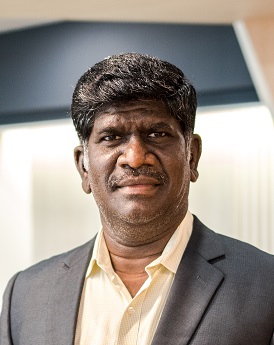
Prof. Elammaran Jayamani
Swinburne University of Technology Sarawak campus, Malaysia
Title: Circular Economy & Sustainability : Ensure their attractiveness, viability, and practicability
Abstract:
This Keynote speech focus on the causes of various Environmental
pollution in terms of Natural resource uses, Urbanization, and Technology
development during Industrial Revolution IR1.0, IR2.0, and IR3.0. Non-renewable
energy sources, coal, oil, and gas, are the most significant contributors to
climate change. A survey says that it accounts for over 75 percent of worldwide
greenhouse gas emissions and approximately 90 percent of all carbon dioxide (CO2)
productions. Greenhouse gas emissions blanket the Earth, trapping the sun's
heat and the roots of global warming and climate change. It causes a rising temperature,
storms, drought, a rising ocean, loss of various species, inadequate food, many
health risks, and poverty. It has become clear that our pattern of life is not
sustainable, as we remove and exploit naturally available resources and a
system more quickly than they manage to recover. It necessitates much knowledge
and support among countries, companies, and people. This keynote comprises
important elements of Sustainability, sustainable materials, and manufacturing,
Industrial Ecology. It focuses on United Nations' Sustainable Development Goal
12 (UNSDG 12), which aims to develop sustainable
consumption and production patterns and ensure their attractiveness, viability,
and practicability. Sustainable consumption necessitates
that services, and related products that respond to basic needs and bring
people a better quality of life. This type of consumption lessens the use of
natural resources and toxic materials.
Moreover, it reduces the pollution a product releases during
manufacture and service and converses the resources for future generations.
Sustainable production is developing and creating a product and its environmentally
friendly service. It conserves and preserves energy resources, is economically
viable, safe and healthy for employees and consumers, and socially and
creatively fulfilling. The most recent response to this challenge is the idea
of the circular economy (CE), defined by some as a decoupling of economic
growth from resource consumption by keeping materials at their highest quality
in a closed loop. A circular economy calls for extending the product life cycle
and the subsequent reuse and recycling of materials and products.
Furthermore, reducing greenhouse gas emissions and environmental
pollution, as well as energy, water, and raw material consumption, are
indispensable for SDG 12. This talk also enlightens how Education is crucial to
achieving SDG-12. Eminence education contributes to dropping waste generation
through presenting and practicing the four 'Rs' - Reduce, Reuse, Recycle, and
Recover. Keeping the public informed and educated provides the necessary tools
to live harmoniously with nature for sustainable lifestyles. Developing
countries' scientific and technological capacities can be strengthened through
education efforts, moving towards more sustainable consumption and production
patterns.
Biography:
Assoc. Prof Dr Elammaran Jayamani is an
Associate Dean of External Engagement
and Impact at the Faculty of Engineering, Computing, and Science at Swinburne
University of Technology Sarawak Campus, Sarawak, Malaysia. A creative educator for over 24
years, promoting sustainable materials research and development. Doctor of
Philosophy in Mechanical Engineering specializing in Materials and Processes
with expertise in Learning and Teaching, Research and scholarship, and
Leadership and Service. Well-versed in training and mentoring students,
research scholars, and educators. He has
completed his Graduate Certificate in Learning and Teaching (Higher Education)
at the Swinburne University of Technology, Melbourne, Australia. He is a Member of the Institution of Mechanical
Engineers - Chartered Engineer (CEng) MIMechE (U.K.). International
Professional Engineering (IntPE) U.K. His main research areas include Polymer
matrix composite materials, Energy and Environmental sustainability, and
Learning and Teaching. He has published over 60 peer-reviewed Scopus Indexed
International journal papers, 30 conference proceedings, and 35 book chapters
and also received several national, international, Educational, and Industrial
funds and grants. He has presented his research at national and international
conferences and received the best paper and presentation awards. He also gave
online national and international Keynote speeches and webinars on Teaching and
Learning methods, Research and scholarship, Sustainable materials and
Manufacturing, Climate change, and United Nations Sustainable Development Goals
(SDGs).